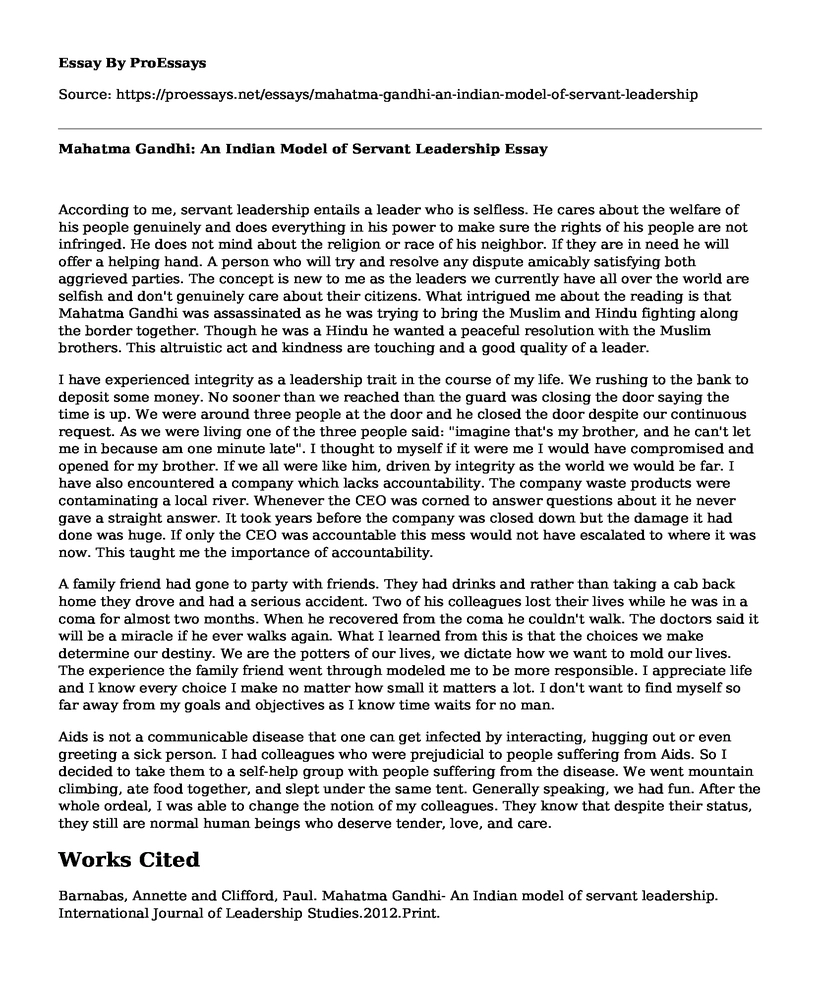According to me, servant leadership entails a leader who is selfless. He cares about the welfare of his people genuinely and does everything in his power to make sure the rights of his people are not infringed. He does not mind about the religion or race of his neighbor. If they are in need he will offer a helping hand. A person who will try and resolve any dispute amicably satisfying both aggrieved parties. The concept is new to me as the leaders we currently have all over the world are selfish and don't genuinely care about their citizens. What intrigued me about the reading is that Mahatma Gandhi was assassinated as he was trying to bring the Muslim and Hindu fighting along the border together. Though he was a Hindu he wanted a peaceful resolution with the Muslim brothers. This altruistic act and kindness are touching and a good quality of a leader.
I have experienced integrity as a leadership trait in the course of my life. We rushing to the bank to deposit some money. No sooner than we reached than the guard was closing the door saying the time is up. We were around three people at the door and he closed the door despite our continuous request. As we were living one of the three people said: "imagine that's my brother, and he can't let me in because am one minute late". I thought to myself if it were me I would have compromised and opened for my brother. If we all were like him, driven by integrity as the world we would be far. I have also encountered a company which lacks accountability. The company waste products were contaminating a local river. Whenever the CEO was corned to answer questions about it he never gave a straight answer. It took years before the company was closed down but the damage it had done was huge. If only the CEO was accountable this mess would not have escalated to where it was now. This taught me the importance of accountability.
A family friend had gone to party with friends. They had drinks and rather than taking a cab back home they drove and had a serious accident. Two of his colleagues lost their lives while he was in a coma for almost two months. When he recovered from the coma he couldn't walk. The doctors said it will be a miracle if he ever walks again. What I learned from this is that the choices we make determine our destiny. We are the potters of our lives, we dictate how we want to mold our lives. The experience the family friend went through modeled me to be more responsible. I appreciate life and I know every choice I make no matter how small it matters a lot. I don't want to find myself so far away from my goals and objectives as I know time waits for no man.
Aids is not a communicable disease that one can get infected by interacting, hugging out or even greeting a sick person. I had colleagues who were prejudicial to people suffering from Aids. So I decided to take them to a self-help group with people suffering from the disease. We went mountain climbing, ate food together, and slept under the same tent. Generally speaking, we had fun. After the whole ordeal, I was able to change the notion of my colleagues. They know that despite their status, they still are normal human beings who deserve tender, love, and care.
Works Cited
Barnabas, Annette and Clifford, Paul. Mahatma Gandhi- An Indian model of servant leadership. International Journal of Leadership Studies.2012.Print.
Cite this page
Mahatma Gandhi: An Indian Model of Servant Leadership. (2022, Mar 29). Retrieved from https://proessays.net/essays/mahatma-gandhi-an-indian-model-of-servant-leadership
If you are the original author of this essay and no longer wish to have it published on the ProEssays website, please click below to request its removal:
- Corporate Social Responsibility (CSR) and Business Ethics Essay
- The Campaigns of Alexander the Great - Paper Example
- Essay Sample on Decision Tree Problems
- Administrative and Teacher Preparation Programs Essay Example
- Corporate Sustainability: PDCA and the 4Sight Approach Paper Example
- Essay Example on Surviving the Future: Essential Skills Needed by Trader Joe's
- Report Sample on Creating a Project Budget







